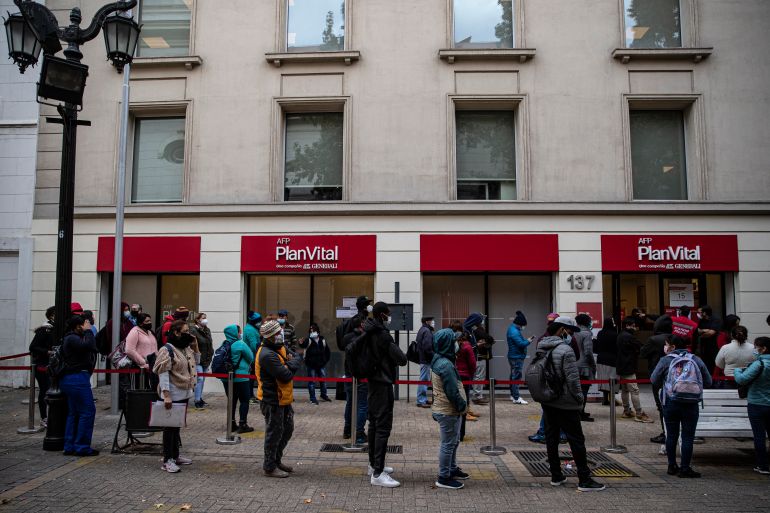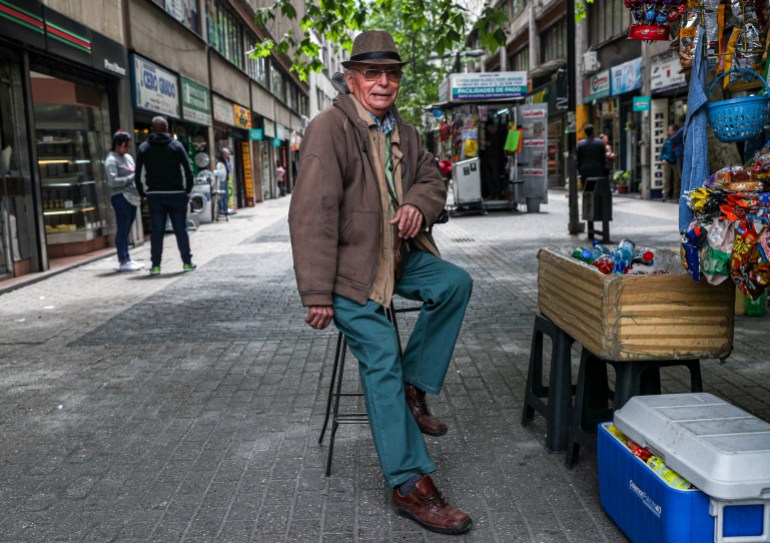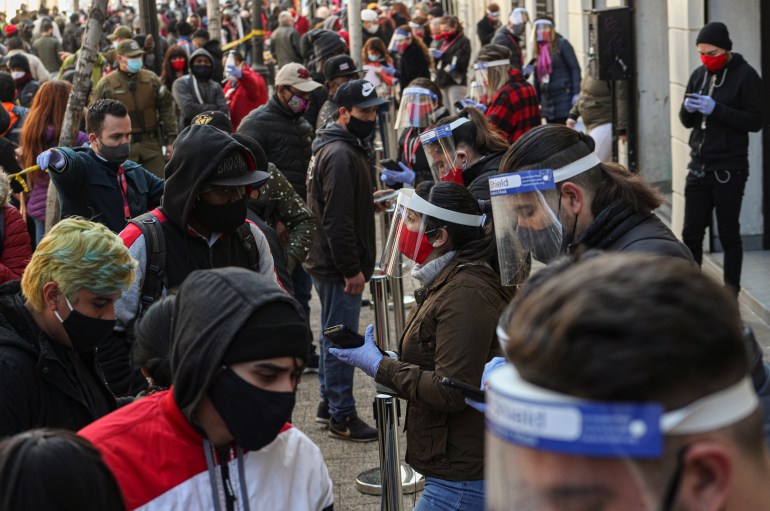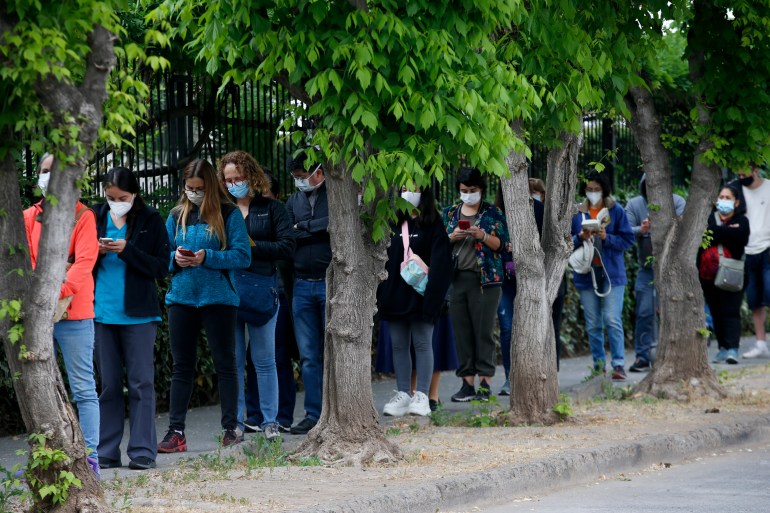Chileans tapped into pensions to survive the pandemic – now what?
Chile’s government has allowed people to withdraw funds from their pensions to weather the coronavirus crisis, but the decision could leave millions without a lifeline in old age.

Carolina Zillmann, 59, owns a small plot of land near La Serena in northern Chile. She lives by herself and takes on jobs as a landscaper to make ends meet. She also has a small cabin that she rents out for $527 to add to her monthly income.
But so far during the coronavirus pandemic, Zillmann has made two withdrawals of one million pesos each ($1,317) from her retirement account to cover her personal expenses. She used the money to pay overdue property taxes and make needed home repairs.
Keep reading
list of 4 itemsMapuche woman to lead body drafting Chile’s new constitution
Chile activists eye chance for unmatched environmental protection
Son of Chile Indigenous leader killed in restive province
She now has six million pesos (less than $8,000) left in her individual account with one year to go before she is eligible for retirement, which Chile sets at 60 for women and 65 for men.
Zillman does not know when she will retire but is confident she will be fine because she expects to receive an inheritance from her mother in the coming months.
The same may not hold true for legions of other Chileans who have collectively withdrawn billions of dollars from their pension funds to weather the pandemic’s financial storm.
“I am not scared of the future,” Zillmann told Al Jazeera, “but many people are because they have no money saved for when they get old.”
Chile’s celebrated $200bn private pensions system, based on individual capital accounts, has served as a model for dozens of emerging markets since it was established 40 years ago during the military dictatorship of Augusto Pinochet.
The system was trailblazing: Chile was the first country to eschew a government-backed pension system and replace it with mandatory private retirement savings.
Over the past several decades, Chile has boasted one of the fastest-growing economies in Latin America. But the narrative of the neoliberal “Miracle of Chile” obscured severe inequalities. More than 30 percent of the country’s people are considered economically vulnerable, according to the World Bank, and income inequality remains persistently high.
But today, in the midst of the COVID-19 crisis, the free-market pension model of the Chicago Boys — Chilean economists who trained at the University of Chicago in the 1970s, under neoliberal icon Milton Friedman — is facing an “existential crisis”, experts say.
In need of reform
Chile’s government spends 2.2 percent of its total economic output each year on pensions, according to the International Monetary Fund (IMF). For Chile’s private Pension Fund Administrators — Administradoras de Fondos de Pensiones (AFPs), which collect fees for managing portfolios — it has been enormously profitable.
But the system is designed to benefit those who are consistently employed in the formal economy and are thus able to make regular payments.
Meanwhile, people who toil in Chile’s large informal economy — which employs one-third of the working-age population, according to the Organisation for Economic Co-operation and Development (OECD) — are often left facing significant retirement fund shortfalls.

That is because workers in the informal sector are typically poorly paid and have little job security. They have little if anything to contribute to their personal retirement accounts over the course of their working lives.
The obvious flaws in the pension scheme are born out by the numbers. Some 80 percent of pensioners in Chile receive less than the minimum wage ($450) per month in retirement.
Anger over the inequities embedded in the pensions system has sparked widespread unrest in the country.
In October 2019, millions of Chileans took to the streets in nationwide protests to demand greater equality, the end of the pension funds system and the right to quality education and healthcare.
A poll published in June by the state-run private pension funds administrator found pension reform remains a top priority for Chileans, edging out both crime and healthcare reform.
Unprecedented withdrawals
When members of the National Congress of Chile proposed letting Chileans withdraw their pension funds to ride out the economic and health crisis caused by COVID-19, Chilean President Sebastian Pinera voiced his opposition to the plan. But the bill spearheaded by opposition lawmakers passed, and Pinera signed it into law on July 24, 2020, allowing citizens to withdraw up to 10 percent of their pensions to weather the COVID-19 crisis.
The country has been hit hard. Chile’s economy contracted 5.8 percent last year, according to the IMF, while the unemployment rate — which only captures the formal sector and therefore understates the true scale of the carnage — was a brutal 10.7 percent.
So far, Congress has approved a total of three withdrawals of up to 10 percent of the funds a person has saved. As of June 2021, some $49.9bn has been withdrawn by beneficiaries from their individual accounts, according to government figures.
And the Central Bank of Chile has warned that repeated withdrawals of 10 percent could generate “significant increases in the risk profile of the Chilean economy”.

Now, these unprecedented withdrawals have left several million people with next to nothing in their retirement accounts, a special COVID-19 report produced by the Economic Commission for Latin America and the Caribbean (ECLAC) found.
That is why Joseph Ramos, an economist and professor at the University of Chile, told Al Jazeera, “There has been a lot of irresponsible populism coming from Congress since the COVID outbreak.”
But with the withdrawals already made, solutions will pivot on what happens next.
Ramos proposes what he calls “a simple idea”: people could postpone their retirement for a year in order to recover the money they took out of their retirement funds.
He realises that may be a tough sell, because “people want to earn better pensions, but do not want to increase the retirement age even though they are living longer”, he said.
More pandemic-related fiscal aid could also stem the tide of pension withdrawals, experts say. In May, the government extended its Universal Emergency Family Income programme (Ingreso Familiar de Emergencia or IFE, in Spanish), which seeks to support households that have been most affected by the health and economic crisis. These benefits, which are calculated by household size, are being distributed between June and August 2021.
But critics say the fiscal spending packages that Chile’s government has put together since the beginning of the pandemic simply aren’t enough. A recent OECD report found that more than half of Chileans are economically vulnerable, and “many households will have to deal with plunging incomes, with few financial buffers to cushion themselves and a substantial risk of falling into poverty”.
Broader concerns
There are also worries about how early pension withdrawals could impact Chile’s overall economic stability. As of February, the withdrawal of assets from pensions “amounted to 14 percent of GDP [gross domestic product] and resulted in about 30 percent of individuals who withdrew funds depleting their pension accounts”, according to the IMF.
AFP fund managers have sold off bank bonds in pension portfolios to meet these redemption requests. To give them more breathing room and buoy prices of the sold assets, the Central Bank of Chile has been buying bank bonds with cash on the secondary market.
But as those bonds command less of a share of pension portfolios, it limits how much the Central Bank can do if Congress signs off on another round of pension withdrawals.
“They [bond purchases] have been effective so far, but they will be less so for new withdrawals, given that the stock of bank bonds held by the AFPs is decreasing and that the Central Bank does not have the power to buy riskier assets, such as corporate bonds or stocks, which it can only do so with Treasury bonds if financial stability is at risk”, Mario Marcel, the governor of the Central Bank of Chile, told Al Jazeera.
For now, the government is not weighing another pension withdrawal. But the ongoing pandemic — and the spread of the highly contagious Delta variant — could change that.
In the end, the COVID-19 crisis may reshape Chile’s pension system in new ways as well.
A Constitutional Convention made up of 155 members has just begun the task of writing a new constitution to replace the one drawn up in the 1980s during the Pinochet era, which spanned from 1973 to 1990.

The representatives chosen to join the Constitutional Convention will have nine months, with a possible three-month extension, to write Chile’s new constitution. It will then be submitted to voters in a plebiscite next year, and voting will be mandatory.
Given the effects of the pandemic on Chile’s economy, experts say, it seems very likely that the new constitution would give the state a greater role in the Chilean economy.
As for Zillmann, she hopes to withdraw all of her money from her pension fund soon, she said, and is no longer interested in contributing to the system because she feels it is designed to favour “the power groups more than the people”.
“I don’t believe in the pension system; it doesn’t work,” she said. “I am against the neoliberal model.”